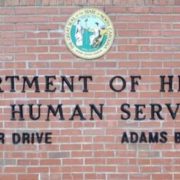‘Unshame NC’ Campaign Takes Aim To Remove Stigma Related To Substance Abuse Disorder, Raise Awareness
— information courtesy of the N.C. Dept. of Health and Human Services
The North Carolina Department of Health and Human Services and First Lady Anna Stein, in collaboration with Shatterproof, announced the launch of the Unshame North Carolina campaign to end stigma related to substance use disorder. Unshame NC has two primary goals: to increase knowledge and awareness of substance use disorder and medications for opioid use disorder as a treatment option.
“Stigma is deeply rooted and causes real harm to people and communities across North Carolina,” said NC Health and Human Services Secretary Dev Sangvai. “Unshame NC is part of a collaborative effort from all of us to end stigma, build acceptance and increase support for treatment for people on their path to recovery.”
“Many people struggling with substance use don’t seek help because of stigma,” said North Carolina First Lady Anna Stein. “This campaign will highlight the stories of people who have experience with substance use disorder and recovery and bring greater awareness to effective methods of treatment for opioid use disorder.”
Unshame NC was launched Tuesday at the Wake County Drug Overdose Prevention Coalition meeting. The website, https://www.unshamenc.org/ includes testimonials from North Carolinians sharing their personal stories of substance use, hope and recovery. Facebook and Instagram content will help drive users to the website, which provides links to resources, including information on how to find the right treatment center, and guidance for providers and for family members seeking care for a loved one. NCDHHS contracted with national non-profit Shatterproof to develop and implement the Unshame NC campaign.
Recent data from a statewide survey indicates 57 percent of North Carolinians know someone with opioid use disorder. Despite this widespread issue, only 34 percent of North Carolina residents know how to find quality treatment for themselves or their loved ones. Additionally, only one in five adults in North Carolina recognizes that opioid use disorder is a medical condition. These findings highlight the urgent need for comprehensive education that connects people to lifesaving resources and treatment.
“There’s no better evidence that recovery is real than a life changed,” said Kelly Crosbie, MSW LCSW, NCDHHS Director of the Division of Mental Health, Developmental Disabilities and Substance Use Services. “We’re pairing the stories of people in recovery with a statewide effort to increase access to MOUD, so more people can benefit from evidence-based care. Real access means supporting people on the recovery journey that makes sense for them, without judgment—and offering them every opportunity for lifesaving treatment, that includes MOUD.”
Unshame NC focuses on the voices and experiences of North Carolinians affected by substance use disorder. Through storytelling, education, and grassroots activation, the campaign demonstrates that people with substance use disorder are valued members of our communities—our family, neighbors, and coworkers—and highlights actionable ways we can ensure everyone has the support they need to thrive.
“While most North Carolinians believe that people with SUD can recover with treatment, stigma and misinformation can create barriers to care,” said Courtney McKeon, senior vice president for Shatterproof’s National Stigma Initiative and longtime resident of the Research Triangle area. “We see this often regarding medications for opioid use disorder, a gold standard of care. Through the stories of North Carolinians, we have the opportunity to increase understanding of all treatment options and support individuals on their path to improved health and wellness.”
“It’s not just about overdoses. It’s not just about lives that were lost or lives that were saved,” says Michael, one of Unshame NC’s story sharers. “It’s also about how we treat the people who went through it and how we bring them out of the shadows. How do we welcome them back into society? How do we get them back to where we need to be? And that requires a lot of folks like me to speak out and help break the stigma.”
People with substance use disorder flourish in environments that offer both community support and multiple pathways for treatment. If you want to share your story with NCDHHS and Unshame NC, you can get involved by filling out a Story Sharer Interest Form or joining the Unshame NC coalition.
Follow @UnshameNC on Facebook and Instagram or visit www.UnshameNC.org to learn more.
If you or someone you know is in crisis, NCDHHS provides somewhere to go, someone to talk to and someone to respond. You can find the help that is right for you 24/7 on the NCDHHS Crisis Services website.
The 988 Lifeline Chat and Text – 988 Suicide & Crisis Lifeline is free, confidential, and available to everyone 24/7 by call, text or chat.
North Carolinians can call the 24/7 Peer Warmline at 1-855-PEERS NC (855-733-7762) to speak with a peer support specialist. Peer support specialists are individuals living in recovery with mental illness and/or substance use disorder who provide support to others.
The NC Recovery Helpline (800-688-4232) offers support and referrals for treatment and resources.
Click Play!



